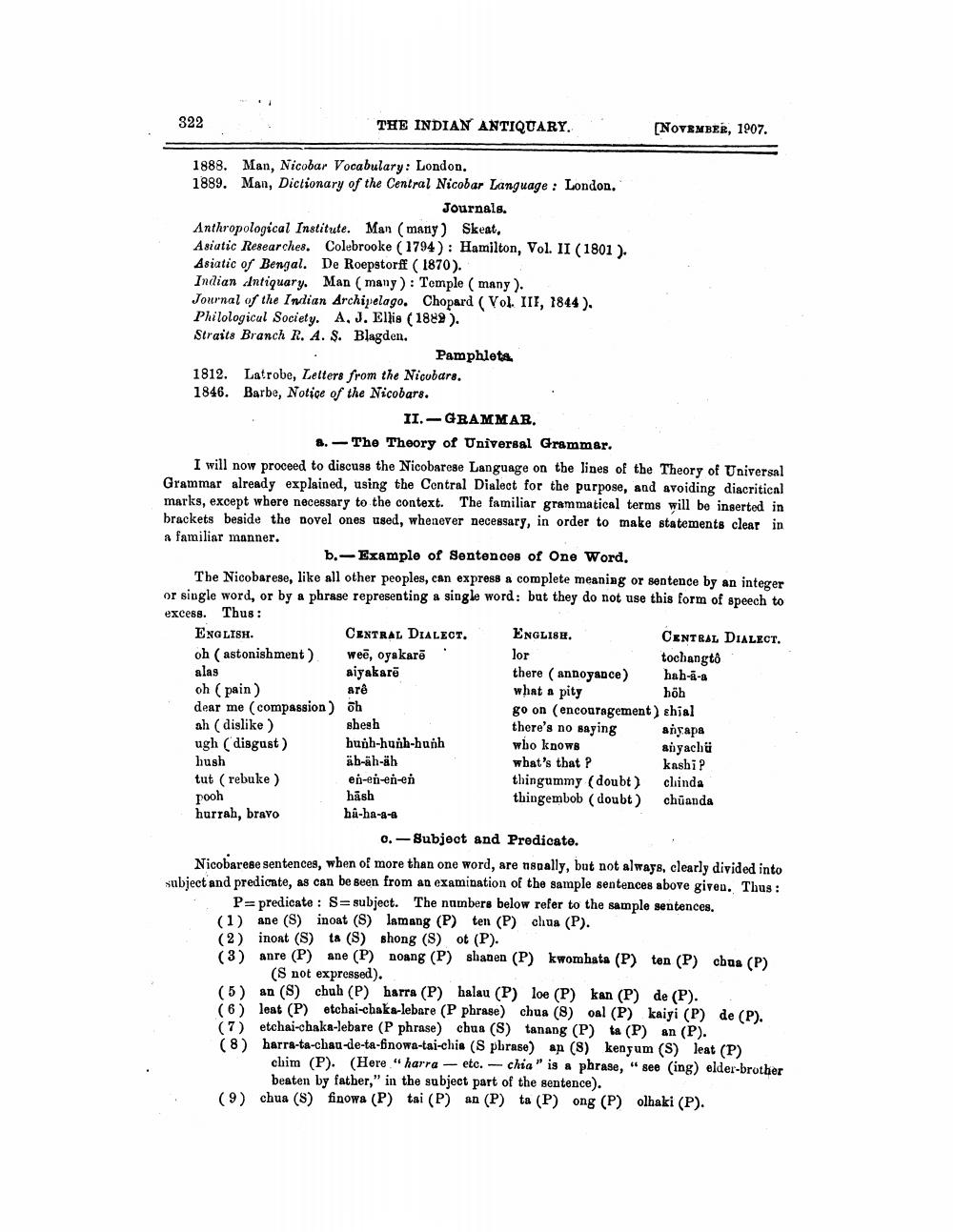________________
322
1888. Man, Nicobar Vocabulary: London.
1889. Man, Dictionary of the Central Nicobar Language: London.
Journals.
Anthropological Institute. Man (many) Skeat,
Asiatic Researches. Colebrooke (1794): Hamilton, Vol. II (1801). Asiatic of Bengal. De Roepstorff (1870).
Indian Antiquary. Man (many): Temple (many).
Journal of the Indian Archipelago. Chopard (Vol. III, 1844). Philological Society. A. J. Ellis (1889). Straits Branch R. A. S. Blagden.
THE INDIAN ANTIQUARY.
1812. Latrobe, Letters from the Nicobars. 1846. Barbe, Notice of the Nicobars.
oh (astonishment). alas
II. GRAMMAR.
8.- The Theory of Universal Grammar.
I will now proceed to discuss the Nicobarese Language on the lines of the Theory of Universal Grammar already explained, using the Central Dialect for the purpose, and avoiding diacritical marks, except where necessary to the context. The familiar grammatical terms will be inserted in brackets beside the novel ones used, whenever necessary, in order to make statements clear in a familiar manner.
oh (pain)
dear me (compassion)
ah (dislike)
ugh (disgust) hush
b.-Example of Sentences of One Word.
The Nicobarese, like all other peoples, can express a complete meaning or sentence by an integer or single word, or by a phrase representing a single word: but they do not use this form of speech to excess. Thus: ENGLISH.
tut (rebuke) Fooh
hurrah, bravo
Pamphlets.
CENTRAL DIALECT.
wee, oyakarē aiyakare
arê
oh
shesh
hunh-hanh-hunh
äb-äh-äh en-en-en-en
hash
hâ-ha-a-a
[NOVEMBER, 1907.
ENGLISH. lor
there (annoyance) what a pity
thingummy (doubt) thingembob (doubt)
CENTRAL DIALECT.
tochangto
hah-a-a
höh
go on (encouragement) shial there's no saying
who knows
what's that ?
anyapa anyachü
kashi?
chinda
chuanda
c. Subject and Predicate.
Nicobarese sentences, when of more than one word, are usually, but not always, clearly divided into subject and predicate, as can be seen from an examination of the sample sentences above given. Thus : P= predicate: S=subject. The numbers below refer to the sample sentences. lamang (P) ten (P) chua (P). shong (S) ot (P). noang (P) shanen (P) (5) an (S) chuh (P) harra (P) halau (P) (6) leat (P) etchai-chaka-lebare (P phrase) chua (8) (7) etchai-chaka-lebare (P phrase) (8) harra-ta-chau-de-ta-finowa-tai-chis (S phrase) an (8) kenyum (S) leat (P)
(1) ane (S) inoat (S) (2) inoat (S) ta (S) (3) anre (P) ane (P) (S not expressed).
kwomhata (P) ten (P) chua (P)
loe (P) kan (P) de (P).
oal (P) kaiyi (P) de (P). chua (S) tanang (P) ta (P) an (P).
chim (P). (Here "harra etc. chia" is a phrase, "see (ing) elder-brother beaten by father," in the subject part of the sentence).
(9) chua (S) finowa (P) tai (P) an (P) ta (P) ong (P) olhaki (P).




